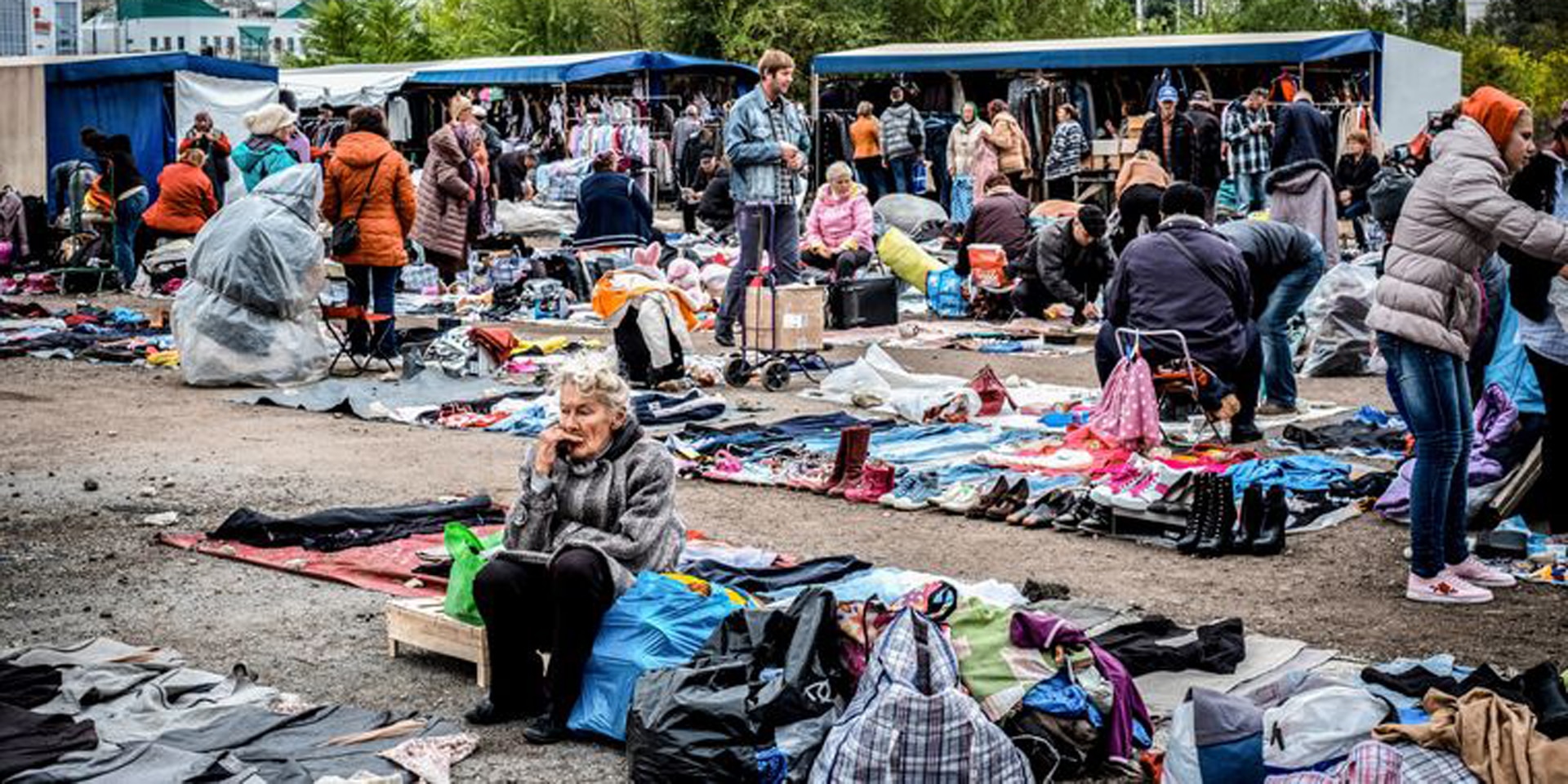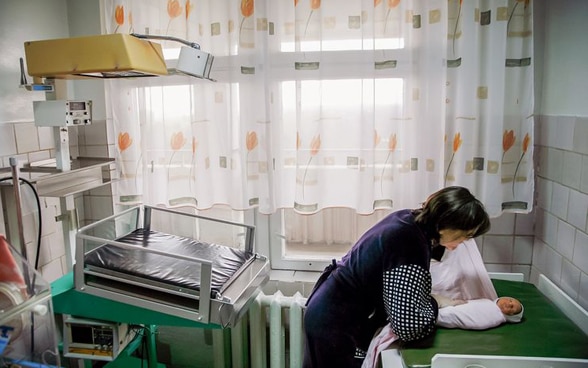Moldova's health system buckling due to emigration
For years, Moldova has suffered from a rapidly shrinking population and the paradoxical situation that many young people are emigrating to the West because of political instability, a lack of employment opportunities and low wages, while at the same time the country faces a shortage of skilled labour. The health sector is in a particularly precarious predicament.

Coming and going: many locals buy and sell products, especially clothes, at the flea market behind the railway station in the capital Chișinău. © Ashley Gilbertson/VII/Redux/laif
Moldova does not top many international rankings, but there is one area in which this small country sandwiched between Romania and Ukraine has been excelling for years: population decline. Since it gained independence, the former Soviet republic has seen its population shrink from 4.3 million to around 3.3 million. If the trend continues, it is estimated that fewer than 2 million people could be living in Moldova by 2050.
The main reason for this decline is emigration. Over the past three decades, political instability, but above all a lack of employment opportunities and low wage levels, have prompted many Moldovans to try their luck abroad, with 1.5% of the population deciding to leave the country every year. Emigration has become the most obvious step for those wanting to better their lot – even during a global pandemic.
Divided nation
Shortly after the Republic of Moldova declared its independence from the Soviet Union in 1991, the thin strip of land east of the River Dniester in turn declared its independence from Moldova. In 1992, a short but bloody war broke out, which was ended by a Russian intervention. The conflict has been "frozen" ever since. Transnistria is not recognised by any country in the world, even Russia. However, Russia acts as a protecting power over the pseudo-state, whose existence safeguards Russian influence in Moldova and prevents closer integration with the West. Although there are no signs of a reunification, contact between the two parts of the country has become easier in recent years. Transnistria inherited the bulk of the heavy industry from the Moldavian Soviet Socialist Republic and still supplies Moldova with electricity.
Many EU passport holders
Rodica Cheptine-Nenita and her husband have been living in London since late last year. For years, the 32-year-old ran a beauty salon in the Moldovan capital Chișinău, as well as teaching make-up courses. "When everyone was suddenly stuck at home during the lockdown, there was no longer a demand for my services. Within four months my business went bankrupt." Government support for the self-employed is minimal in the impoverished country. "My husband used to work in London and has family there so it seemed an obvious choice to try and make a new start there."
The end of free movement for EU citizens at the end of the year spurred on the decision, she says. Many Moldovans also hold Romanian passports, which are easy to obtain for historical reasons. In the interwar period, most of the country was part of Romania, and the two nations share the same language. Rodica and her husband have kept their home in Chișinău for the time being, but she thinks they are unlikely to return. "Ultimately, quality of life in the UK is worth more than social recognition in Moldova." Her husband is a film producer, but his most recent job in London was as a supermarket manager.
Few come back
"A low rate of return is characteristic of Moldova," explains Olga Gagaus of the National Institute for Economic Research in Chișinău. The sociologist has been studying demographic trends in her country for a number of years. It is mostly younger people who migrate and many then start a family abroad, so the demographic effect is doubly negative, she says. "Even in the pandemic there have been no signs of the trend really reversing." While short-term labour migration came to a temporary standstill, as it did everywhere, as soon as travel restrictions in the West were eased for urgently needed workers such as fruit and vegetable pickers and nurses, many were packing their suitcases once again.
What's more, Moldovans living abroad permanently preferred to stay in their host countries, says Gagaus. "Hardly anyone trusts our health system." In other Eastern European countries severely impacted by emigration, many of the diaspora returned during the pandemic. After all, working from home means that you can be anywhere. And there are signs that at least some of them will remain in their countries of origin for the long term. In recent years, Poland, the Czech Republic and Romania have seen booms in sectors such as IT, where salaries for skilled workers have in part caught up with those in the West. In Moldova, these incentives are lacking. Well-paid jobs are virtually non-existent.
Moldova has experienced different phases of emigration. Following the collapse of the Soviet Union, much of the Jewish community emigrated to Israel and Germany, while some in the Slavic-speaking minority moved to Russia when independence led to a greater emphasis on national identity. On top of this, there was a brief war centred on the region of Transnistria in the east of the country. In parallel with this "ethnic migration", there began to be seasonal migrations to Russia, where many Moldovans worked as traders or construction workers. Moldovan citizens have never needed a visa to enter Russia. Later on, in line with a similar trend in Romania, Moldova started to see irregular labour migration to the West, especially Italy and Spain.
As a result of amnesties in these countries, Romania's accession to the EU in 2007 and the scrapping of visa requirements for Moldovans entering the Schengen Area in 2014, there were more and more legal opportunities to move to the West and settle there as a family unit. This also made emigration more attractive to the highly skilled.
Shortage of skilled workers
In Moldova, this has led to the paradoxical situation that many young people are emigrating in search of employment opportunities while at the same time the country faces a shortage of skilled labour. The health sector is in a particularly precarious predicament.
It is true that other Eastern European countries are also seeing thousands of skilled healthcare workers emigrate every year. However, in Romania, for example, at least some of these are replaced by immigrants, not least from Moldova itself. By contrast, there is virtually no immigration into Moldova. Even the government makes no attempt to gloss over the alarming scale of the problem. Acting Prime Minister Aureliu Ciocoi said recently in an interview that the government's mission is to ensure that Moldova remains a viable state.

Creating new barriers to emigration, as suggested by a Romanian minister some years back, is not considered a feasible solution by most experts. "As a country we also benefit from having our citizens abroad," explains sociologist Olga Gagaus, "not least economically." In 2019, remittances from the diaspora accounted for 15% of Moldova's entire economic output. In 2006, it was as much as 35%. "Without this money, the poverty rate would be over twice as high." A more constructive approach, she says, would be to amplify the positive effects of migration, for example by supporting knowledge transfer. The state-run investment promotion programme is also a move in the right direction, she claims, despite poor results. Until now, remittances have been channelled almost exclusively into consumption.
In the long term though, Gagaus says, Moldova needs to create the conditions that make people want to stay. "That's the only way to reverse the trend." In a country so marked by corruption and mismanagement, there is a long way to go to achieve this, but the victory of reformer Maia Sandu in November's presidential election has inspired optimism in many pro-Western Moldovans. Rodica Cheptine-Nenita, now living in London, says: "Mismanagement of the country is what drove many of us abroad. At least we now have a president we don't have to feel ashamed of." It is worth noting that the diaspora played a key role in Sandu's election victory.
Carrying reformers' hopes
Moldova is a prime example of a captured state, in which oligarchic networks siphon off most of the resources. This was exemplified by the 2014 bank fraud scandal in which a total of USD 1 billion disappeared. People profiteering from this system can be found in both the pro-Western and pro-Russian camps of the political establishment. In the past few years, a third political force has emerged, the ACUM electoral bloc, which is credibly committed to constitutional reforms and the fight against corruption. As the leader of one of its two constituent parties, Maia Sandu, a Harvard graduate and former World Bank adviser, headed a short-lived coalition government, which collapsed in the face of opposition to its reform plans. However, she staged a comeback to win the 2020 presidential election, becoming the country's first female president. Sandu plans to hold fresh elections as soon as possible with a view to establishing a new reforming government.
Home – despite everything
And in spite of all the challenges, there are some young people who do see a future in their homeland and are coming back. Alexandru Macrinici moved to Romania in 2011 to study directing. He funded his studies with a scholarship and a job at an employment agency, neither of which would have been available in Moldova.
He is currently writing his doctoral thesis. Though enrolled at the University of Târgu Mureș in Romania, he spends most of his time in Chișinău. After completing his studies, he plans to stay in Moldova where he wants to run theatre pedagogy projects. "Life would be easier in Romania, especially during the pandemic," says the 28-year-old. On the other hand, Moldova offers him a lot more scope to realise his vision, he says, since the things he plans to do are completely new here. "For me it feels right. I want to make a difference here, in my own country."
Moldova factsheet
Name
Republic of Moldova
Surface area
33'843 km2
Population
3.3 million
Capital
Chișinău (population: 530,000)
Languages
Romanian; in some regions also Gagauz, Russian and Ukrainian
Religions
Orthodox Christians 98.5%
Jews 1.5%
Baptists and others 0.5%
Article by Volker Pabst, published in One World 02/2021
Volker Pabst is South-East Europe correspondent for the Swiss newspaper NZZ and lives in Istanbul.
